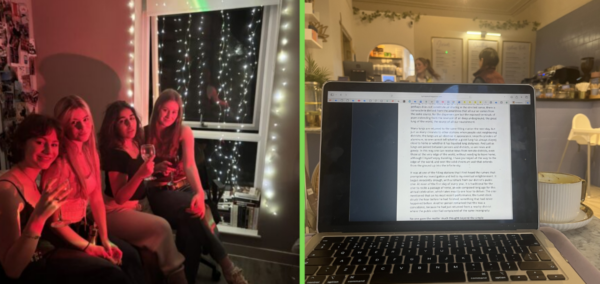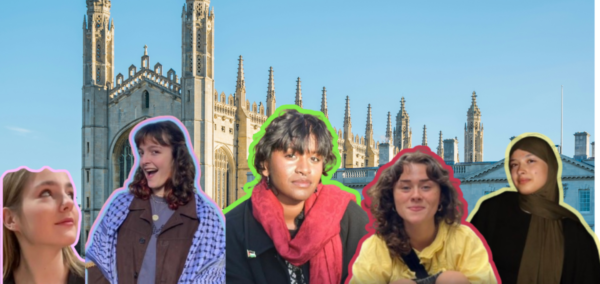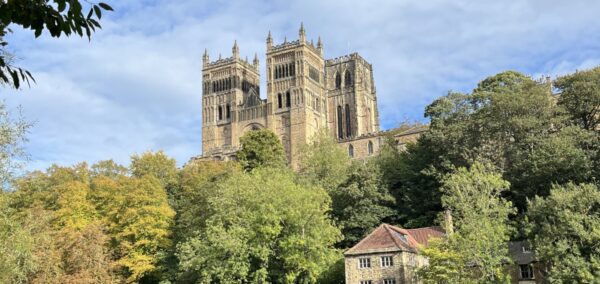
Pro-Palestine protesters occupy a room at UCL and declare it an ‘Apartheid Free Zone’
Protestors occupied the Jeremy Bentham room on Friday and claim they will stay until their list of 10 demands are met
Pro-Palestinian protesters have occupied a room at UCL, branding it as an “Apartheid Free Zone” to educate people about the “struggle of the Palestinian people.”
The occupation began last Thursday in the Jeremy Bentham room inside the university’s main building, marking an escalation in ongoing protests again UCL’s stance on the situation in Israel and Palestine.
Organisers insist that the action will continue until their list of 10 demands are met by UCL, and have set up a makeshift food, study and sleeping arrangements.
The occupation, organised by UCL Action for Palestine, comes after months of protests including marches, pickets, and commemorative ribbon-tying events. The organisers criticise the university for what they describe as its “complicity in Israel’s genocide” in Gaza, with the university maintaining ties with Israeli universities and refusing to condemn either side.

The outside of the occupied room
Amna Ghaffar, a spokesperson for UCL Action for Palestine, spoke to the London Tab about why they began the occupation.
She explained: “We’ve done so many things to no avail… [and] the university consistently fails to respond in an adequate way without acknowledging the actual demands or issues that we are raising.”
Amna also said that their action is part of a broader escalation of civil action “heeding the call of Palestinian civil society to peacefully disrupt all the systems that are enabling Israeli apartheid and genocide.”
The organisers have made 10 demands – seven to UCL and three to the Students’ Union. UCL Action for Palestine demand that UCL:
“1. Cuts all ties with arms companies and companies on the BDS (Boycott, Divest, Sanction) list.
2. Ends censorship and criminalisation of pro-Palestinian activism on campus
3. Adds its institutional voice to the global call for an immediate, permanent, and sustainable ceasefire, noting the ICJ ruling which states Israel is plausibly committing genocide.
4. Directs a pot of funds of at least £250,000 ring-fenced for scholarships available to Palestinian students to study at UCL. UCL must offer sanctuary, additional support and funds for Palestinian academics.
5. Makes official the student-led renaming of Refaat AlAreer Student Centre and an institutional acknowledgement of his contributions.
6. Stops banking with Barclays, which holds over £1 billion in shares and provides over £3 billion in loans to companies which directly support Israel’s apartheid and its genocidal attack on Gaza.
7. Practices full transparency in regards to all funding, sponsorships, research partnerships and collaborations at the managerial and departmental level. Issue an annual report on ties with arms and fossil fuel companies and how it is working to divest from them.”
The group also demand that the Student Union:
“1. Bans societies from inviting arms and fossil fuel companies from campus.
2. Commits to establishing Apartheid Free Zones on SU spaces across campus (including cafes, bars, etc)
3. Practices full transparency in regards to all funding, sponsorships, partnerships and collaborations which involve the Union and its affiliated societies.”
Amna maintained that the occupation will continue until all of these demands are met. She asserted: “Until [these demands] are met, for the foreseeable future, we plan to stay here.”
Members of the occupation have been staying overnight in the room, with organisers providing food and bedding donated from various parties and holding a range of creative activities and educational events.
Amna praised the assistance they’ve received: “We’ve been very lucky that a lot of individuals in the group have been donating, whether that’s money directly to a Paypal we’ve set up, or people bringing in food or bedding or supplies.”
She also described how after a “hectic and stressful and intense” first two nights, they are now “establishing the occupation better.”
The organisers have been hosting various events in the Jeremy Bentham room, including banner making, solidarity workshops, film screenings, and a nightly group Iftar and community dinner as several protesters are fasting for Ramadan.
Amna described it as “a very productive and supportive environment.”
She also praised the supportive response from UCL security, especially outsourced guards whose union, IWGB, recently passed a motion supporting the occupation, with the UoL branch of the IWGB endorsing the Apartheid Free Zone “unanimously.”
This weekend our branch committee unanimously passed the motion below, endorsing the Apartheid Free Zone created by the UCL student occupiers in the Jeremy Bentham Room.
Solidarity, we support you ✊ https://t.co/fqBqClXXog pic.twitter.com/ItxK7ggtZs
— IWGB Universities of London (@IWGBUoL) March 18, 2024
The UCL branch of the UCU academic union also passed a motion supporting the occupation with 96 per cent approval.
Despite this support, UCL management’s cooperation is crucial to the demands being met, and Amana criticised the response from UCL Provost Michael Spence. She said: “We… received a very disappointing response from the Provost that failed to acknowledge most of our points or provide any adequate responses.”
She believes that a face-to-face meeting is the best step towards ending the occupation, to provide an “actual productive conclusion.”
Amna also expressed concern that the attitudes of management towards the occupation may harden. She said: “We are a little cautious that management and the heads of security have not been antagonistic, and we’re aware that things could change. They don’t really have any legal powers to ask us to leave. But we never know, so it is just a waiting game to see what they do pull out of their toolkit.”
The Provost reportedly met with the heads of security last Friday to discuss their options.
The occupation has also faced challenges from students, with some showing up to debate issues with protesters. One student even called the police, with eight to nine police officers reportedly attending the occupation to investigate whether the protesters were in breach of the law. No charges were pressed.
As the occupation enters its fifth day, Amna asserts: “We’re just staying strong with the fact that we’re not going to leave until our demands are met.”
A UCL spokesperson said: “We have a small student occupation on campus and are continuing to monitor the situation.”
An SUUCL spokesperson said: “We are aware that the students occupying the JBR have made three demands to the students’ union. We are yet to receive a policy proposal from students on these demands or be asked directly about them, but the below summarises our current position on each demand:
Demand one – banning societies from inviting arms and fossil fuel companies from campus. The Students’ Union chooses not to invite fossil fuel or arms companies to advertise on campus, attend the Welcome Fair, or hold pop-up stands on campus. However, students’ union affiliated societies can, if they choose to, invite guest speakers from arms or fossil fuel companies to campus. If the students’ union tried to prevent this, we could be in breach of the Higher Education Freedom of Speech Act.
Demand two – establishing an “Apartheid Free Zone” in students’ union spaces. The Students’ Union is a charity, regulated by the Charity Commission. It must, at all times, consider whether its actions fall within its stated objectives. It is our view that we couldn’t legally implement demand two. In 2017, several students’ unions were investigated for implementing BDS policies by the Charity Commission and reminded of their legal duties in this area. In addition to this, a Bill is currently in the Lords which aims make it illegal for public bodies to ban the sale of products because of political or moral disapproval of foreign states. Although the Union is not a public body, we are tenants in property owned by a public body.
Demand three – Practices full transparency. We are required by our Articles of Association to list the companies and organisations we are affiliated to. Students (members of the Union) must vote to approve any new affiliations, our independently audited accounts are published annually on GOV.UK, and minutes from our democratic forums are published on our website. We’re very open to enquiries from members on any topic and will always aim to help facilitate accountability of the union’s officers and decisions.”
Featured image via UCL Action for Palestine
Related articles recommended by this author:
• Queen Mary guards ‘break into’ UCU offices and tear down pro-Palestine posters
• Protestors ‘rename’ UCL Student Centre honouring Palestinian alumnus killed in Gaza
• UCL students protest university’s neutrality towards Israel-Gaza and tie ribbons for dead


















